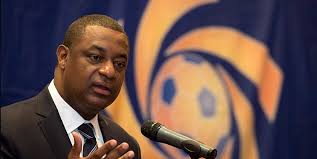By Paul Nicholson
June 13 – The CONCACAF congress last week included on its agenda the first report of its newly created Sports Integrity Department, delivered by Dr Laila Mintas. Her report included results on investigated cases and the announcement of a whistleblower hotline for fans, players, coaches and executives.
The importance of the unit was underlined by CONCACAF president who could have been speaking about his key role in FIFA’s anti-discrimination task force in his remarks.
“The integrity of the game will remain one of our highest priorities,” said President Jeffrey Webb. “This is a huge challenge and the biggest threat to the game, potentially impacting every single member of CONCACAF. Protecting our beautiful game means that we must all share in one common goal, which is to ensure zero tolerance and embrace all aspects of integrity.”
Webb acknowledged El Salvador for its efforts in the fight against match fixing. The country lost pretty much its whole national team in a match-fixing scandal that has now resulted in a strictly enforced zero tolerance approach and sanctions against offending players.
CONCACAF has taken a lead amongst confederations with its approach to match-fixing – though they brand it under a wider ‘Integrity’ banner.
Created last November with Mintas brought in from FIFA’s Early Warning System to head it up, the Sports Integrity Department has created the confederation’s action plan starting with a strategy of prevention through education and creating “efficient regulations against match fixing, investigation and sanctioning match fixing cases with zero tolerance,” says Mintas.
Core to the progress of the Integrity division’s work was getting the congress approval of the CONCACAF Code of Ethics.
This Code contains several essential regulations against match fixing for the entire CONCACAF family, including:
– Prohibition of unlawfully influencing the course or result of a match (match-fixing)
– Prohibition of betting on football matches
– Prohibition of participating in the betting sector
– Prohibition of disclosure and utilisation of insider information
– Obligation to report any behavior that could damage the sports integrity
– Obligation to immediately report if approached to manipulate a match (gro.f1745224009acacn1745224009oc@yt1745224009irget1745224009ni1745224009 )
– Obligation of the parties to support CONCACAF’s investigations
Two of the newer measure that have now come to fruition are the establishment of a confidential whistleblower system and the ‘single point of contact’ initiative.
The whistleblower systems allows anonymous and confidential reporting of incidents via a hotline or web portal. The ‘Single Point of Contact’ requires every Member Association to nominate a direct contact person for CONCACAF’s Integrity Department in order to coordinate measures within the national associations.
“Over the last couple of month, we have been implementing the framework to fight match-fixing effectively within our region. We created several different measures like education and prevention programs for players, referees and officials, we created an efficient legal basis to prevent, investigate and sanction such cases and launched a whistleblower system. We need to bring our messages down to the bottom of the football pyramid, to the national leagues, clubs, to every player, every referee and every official,” said Mintas.
Mintas closed her presentation to Congress saying: “We need to fight match-fixing in our region all together, as one team. Let us sending out to the world the message that CONCACAF will fight against match fixing united and with zero tolerance.”
The next stage is for the member associations to bring their full support to the initiative so that match-fixing can be fought in a co-ordinated way across the region. Harnessing the federation by federation support and buy-in is Mintas’ next major challenge.
Contact the writer of this story at moc.l1745224009labto1745224009ofdlr1745224009owedi1745224009sni@n1745224009osloh1745224009cin.l1745224009uap1745224009

